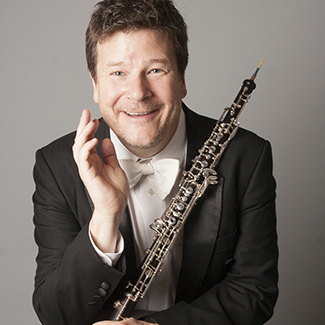From Mendelssohn to Coleman, NWS explores a range of chamber music

From bluesy riffs to majestic marches, evocative pastorales, and impassioned melancholy, Sunday’s streamed New World Symphony concert had it all. The virtual chamber program featured the orchestra’s fellows and oboe alumnus, Jonathan Fischer.
Valerie Coleman’s Red Clay and Mississippi Delta (2010) opened the concert, a work that in the composer’s own words “combines the traditional idea of musical scherzo with living in the South…from the juke joints and casino boats that line the Mississippi River to the skin tone of kinfolk in the area: a dark skin that looks like it came directly from the red clay.” The wind quintet is filled with flickering gestures and vibrant swells. While fully notated, hints of improvisatory elements, especially in the clarinet, appear above snappy syncopations and contrapuntal textures that sway in and out of grooves. The fellows showed an excellent sense of populist style and ample charisma backed by compelling technical command.
Fischer, principal oboist for the Houston Symphony, appeared in two contrasting pieces: Howard Hanson’s Pastorale for oboe, harp, and strings (1949) and Benjamin Britten’s Phantasy Quartet for oboe, violin, viola, and cello (1932). The two works sound as though written in reverse order: Hanson’s language relishes in the conservatism of the past, while Britten’s edginess hails from the future.
Written shortly after WWII, the Pastorale’s bucolic nature is injected with darker, sorrowful colors from the two-note slurs. Fischer ushered in the spacious landscapes with a generous and floating tone. The strings, warming up the texture, expand upon the oboe’s theme building up to a dynamic explosion. An abrupt cutoff gives room to a pensive moment, upon which the oboe “speaks” its last words resembling the opening statement, only now more ominously.
Britten’s Phantasy Quartet, written when the composer was only 19 years old, mimics a palindrome, as the cello frames the work with a halting march-like ostinato. Britten creates stark contrast by juxtaposing the string trio’s broken articulations with the oboe’s sprawling legato lines. The strings are soon lured into the sound world of the oboe as their articulations lengthen, leading to the fantasy section. Overlaying rhapsodic fragments generate a near-chaotic environment only to disintegrate into a swirling, vertiginous accompaniment for the oboe to soar on. A forceful retake from the strings, as if removing a dream-like veil, catapults us back to where it all began. The quartet navigated the dense score deftly, projecting clear musical intent throughout.
Karel Husa’s Divertimento for brass and percussion (1959) stems from the composer’s Eight Czech Duets for piano four-hands. The Divertimento is comprised of four movements. A regal, processional Overture is followed by a hocketing circus-like Scherzo of jarring harmonies and offbeat rhythms. The Song is a somber, nocturnal soundscape sprinkled with whimsical punctuations of the glockenspiel. The finale, Slovak Dance, is a theme and variations introduced by an unassuming tuba solo, showcasing quirky rhythmic inflections, foreshadowing a storm that is amped up by the snare drum, which brings the set to an end.
Stricken over the loss of his beloved sister Fanny, the 38-year old Felix Mendelssohn poured his anguish into his String Quartet Op. 80, no. 6 in F minor. Completed a couple of months before the composer’s passing, this quartet is relentless, a tour de force for the soul and mind. Agitated tremolos and insistent figures spring forward with fervor and were rendered sweepingly by violinists Dillon Welch and Scott Jackson, violist Gabe Napoli, and cellist Clare Bradford in this outstanding performance.
With three out of the four movements in F minor, even the Scherzo could not escape the work’s turbulence. Mendelssohn’s typical Puck-like characterizations seem light years away here. Occupying its place, is instead a movement of tense phrases that latch onto one another, a breathless atmosphere. Some relief is brought by the gentle third movement, a song without words reflecting a bittersweet tribute to Fanny’s life. The performers allowed for each yearning line to come through, while maintaining a unified sonority. The respite was brief as we were quickly taken into the wild ride of the final movement. Intertwining lines built momentum for the first violin to reach into the stratosphere with lofty vibrato, and rumbling triplets propelled the music to an aching end.
New World Symphony’s virtual concert season continues 7 p.m. Monday with “Live from our Living Room.” https://www.nws.edu/events-tickets/concerts/
Posted in Performances
Leave a Comment
Mon Mar 22, 2021
at 11:38 am
No Comments
